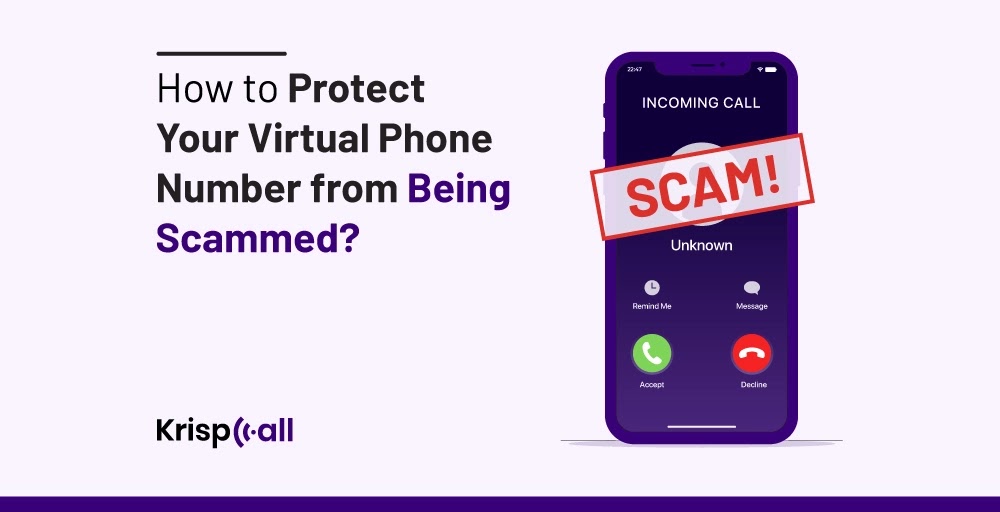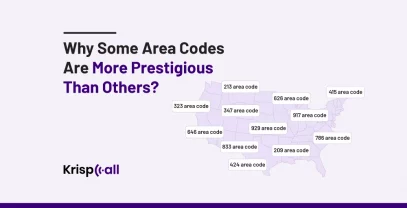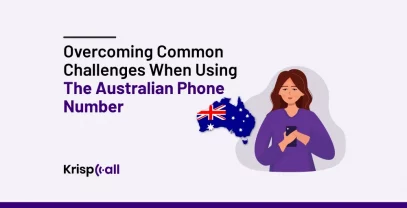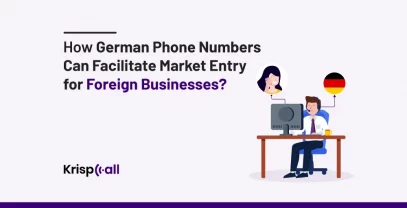Virtual phone numbers are a great way to protect your privacy and keep your personal phone number safe from scammers. However, if you’re not careful, your virtual phone number can still be compromised.
Scammers are always looking for new ways to steal your personal information and money.
They can use your phone number to send you send scam text messages and phishing email links that look like they’re from a legitimate company or call you and pretend to be from a government agency or a financial institution.
Also, they can ask you to provide personal information, such as your credit card number or Social Security number to steal your identity, conduct fraudulent activities, prey on your friends, and take over your social media accounts.
However, fear not! There are a few things you can do to protect your virtual phone number from being scammed.
By the end of this post, you’ll know how scammers get your number and what they can do with it, and as a bonus, you’ll learn how to protect your virtual phone number from scams and how to prevent spoofing.
How Does Someone Get Your Phone Number?
Someone (Hacker, Scammer, Malicious actor) can get your virtual phone number through various activities.
- Someone gets your phone numbers through your social media sites if you publicly post your phone number there.
- If you have used your business virtual numbers in the advertisement campaigns, someone will gain access to your virtual number.
- They can get your phone number from the data brokers.
- Someone gets your virtual phone number if you reply to scam messages or click on random links.
- Someone can access your number if you use your phone number to sign up on a particular website or fill out online surveys.
What Can Someone Do With Your Phone Number?
In the past, hackers couldn’t do much damage with just your phone number after obtaining it. But today, due to technological advancement, hackers can attempt to take over your online accounts to steal your identity.
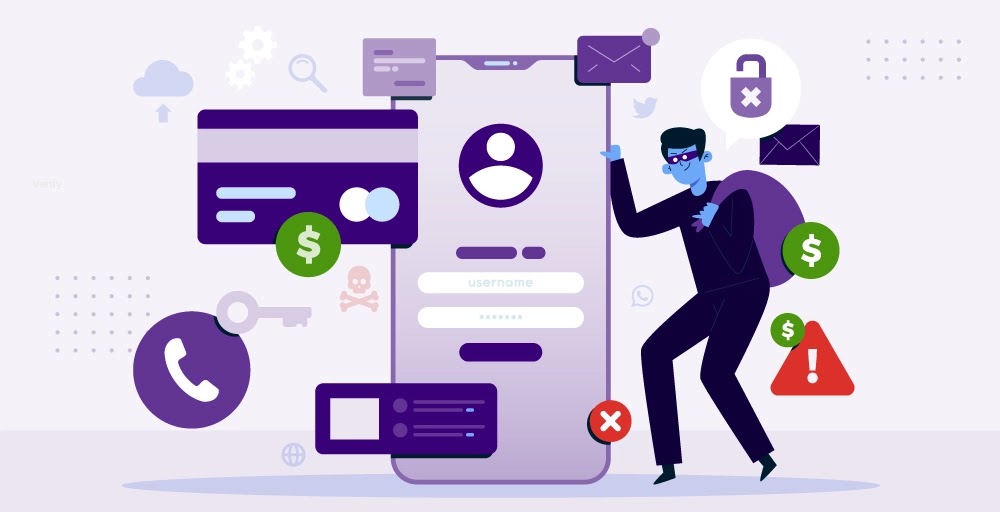
After getting access to your virtual phone number, someone (hackers/scammers) can do the following:
1. Identity Theft
Scammers can use your virtual phone numbers to collect more personal information about you. That personal information can be your date of birth, temporary and permanent address, names and contact details of your close friends and family members, and Social Security Number (SSN). By referencing that information, they will try to steal your identity.
2. Scam Calls and Texts
Scammers can use your virtual phone number to send text messages or make phone calls to scam people to obtain their personal information or steal money.
They may trick you into giving your email accounts, bank information, current address, social media accounts, photos, etc.
3. Reroute Text Messages and Calls
Hackers can reroute the text messages and phone calls meant for you on their number after stealing your personal information and thereby passing the security test. Afterward, they use the “Forget password” option to send the reset password link to their phone to take over their Google accounts.
Once they have complete access to your Google account, it is easy for a hacker to reset passwords for your social media accounts.
4. Sim Card Swapping
Sim card swapping occurs when a scammer calls your mobile phone number provider and tells them to activate your mobile number on their device.
Once the swap process is completed, someone will try to take control of your accounts and personal information.
5. Account Takeovers
Someone can use your virtual number to take over the online/ social media accounts you sign up for with your phone number. As soon as they gain access to your online accounts, they use it to send spam messages to your social friends.
6. Harassment
Someone can use your phone numbers to obtain sensitive information about you and share it on social media. It damages your reputation and mentally harasses you.
7. Fraudulent Activities
A malicious actor can use your virtual phone number to do fraudulent activities, such as signing up for services with your phone number, making fake purchases, or conducting scam operations.
8. Impersonation
If someone gains access to your virtual phone number, they can attempt to impersonate you by using it for communication or verification.
This results in identity theft or reputational damage. They may also try to call your loved ones pretending to be you and even scam them.
9. Blackmailing
Someone who obtains sensitive information through your virtual phone number can blackmail you to release your sensitive information to the public. Their blackmailing includes threatening messages, demands for money, and spreading false rumors using your phone number. It could lead to harm to your reputation.
10. Send Malware and Spyware
Hackers can also use your virtual phone number to send malicious text or links to friends and contacts. They can pretend to be from banks, hospitals, insurance companies, or government companies through text messages and ask you to click on the link given.
Once you click on the link, spyware software will be downloaded on your device through which hackers can obtain your personal information and access your social accounts.
11. Target Your Friends and Families
These days scammers not only target you after obtaining your phone number, but they can also use your phone number to prey on your loved ones (Friends and Family members).
They may send scam messages or spoof calls stating that you are in a problem and trick them into sending money to come out of the emergency. Your families will then send money to scammers without knowing they’re wiring it to scammers.
12. Social Engineering
Social engineering is a technique malicious individuals use to manipulate people into disclosing confidential information or performing actions that could compromise security.
Armed with personal information like your phone number, someone can attempt to manipulate customer service representatives or support staff in various ways to gain unauthorized access to your accounts or services. Scammers usually try to manipulate banking staff and gain access to your bank details.
How to Protect Your Virtual Phone Number from Being Scammed?
Phone number spoofing is a serious scam in which a criminal disguises a caller ID, phone number, or text message to persuade people that they are from a trusted organization or company located in a particular location. Through spoofing, a criminal tries to obtain a target’s personal information, including their bank details.
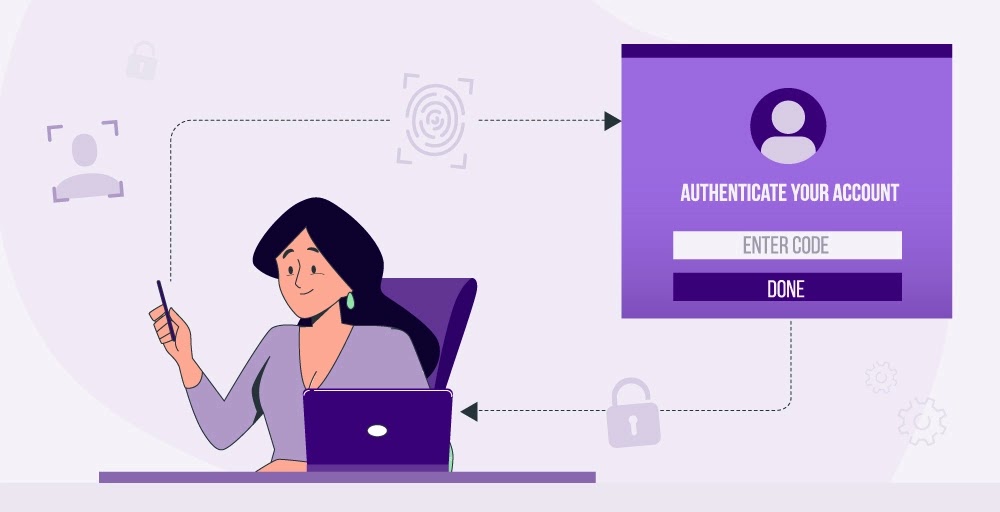
Below are some of the measures you can consider to protect your virtual phone number from being scammed.
1. Don’t Share Your Phone Number with Strangers
One simple and easy way to maintain your phone number privacy and stop phone number spoofing is to limit phone number sharing with strangers and on your social media accounts.
Hackers obtain your phone number through your online social media platforms. Thus, you should never publicly post your phone number or write it in public posts or comments; always keep it private and maintain online security.
Also, limit your phone number sharing on an untrusted site when signing up. Before providing your phone number to websites, always read the privacy policies. Take a moment to understand how those sites will use and protect your data.
2. Enable Two-Factor Authentication (2FA)
Keep Two-Factor Authentication “ON” on your every online account. 2FA adds an extra security layer and prevents data breaches by requiring two identification process checks before accessing your data or resources.
Moreover, attackers are less likely to access a victim’s device or online account even after hacking the passwords because they can’t pass the authentication check with just a password alone. They must enter separate authentication codes to access the victim’s online accounts fully.
Likewise, you can either use SMS-based 2FA or authenticator apps like Google Authenticator, Authy, Microsoft Authenticator, MFA Authenticator, etc., to enable Two-Factor Authentication on your devices and social media accounts.
3. Get Virtual Phone Numbers from Trusted Provider
Another effective way to stop someone from spoofing your phone number is using a highly secured cloud-based virtual phone number to sign up on social sites or websites to pass the verification step. Virtual phone numbers provide an additional layer of privacy and security by letting you monitor, track, transfer, and record every phone call.
Get Cheap Secured Virtual Phone Numbers
Get affordable virtual phone numbers from all over the world for personal & professional use.
Select numbers :
Never purchase phone numbers from underground marketplaces, as they illegally supply phone numbers just to avoid paying taxes. You may end up in legal trouble if you get involved with those illegal markets.
Besides this, you can also use cloud-based temporary numbers instead of virtual numbers or real phone numbers.
4. Regularly Review and Update Privacy Settings
Regularly review the privacy settings on your social media accounts. Check who can see your phone numbers and other personal information online. If your phone number is publicly visible, set the status to “only me.”
5. Be Vigilant About Suspicious Activities
You should remain vigilant about suspicious activities associated with your phone number, such as increased spam calls or messages. If you get verification or login codes on your phone number unexpectedly, it may mean that someone is trying to access your accounts secretly.
Also, avoid clicking on suspicious links sent to you via text messages. Never provide your personal information to an unknown person on a phone call. You should install apps like Truecaller on your cell phones that display the name and other information of the caller. This will help you decide whether to pick up the calls or not.
Conclusion
In this blog, we discussed the risks associated with someone getting your phone number, ranging from stealing personal information and making fake profiles to blackmailing you into revealing your sensitive information to the public.
After identifying risks, we also shed light on how to stop someone from spoofing your phone numbers. There are various ways to avoid being the victim of phone spoofs, like enabling Two-Factor Authentication (2FA), not purchasing phone numbers from underground marketing, periodically reviewing privacy settings on social media profiles, limiting exposure of phone numbers on online platforms, and so on.
Adopting any of these measures can significantly reduce the chances of being a victim of fraudulent schemes and phone scams.

